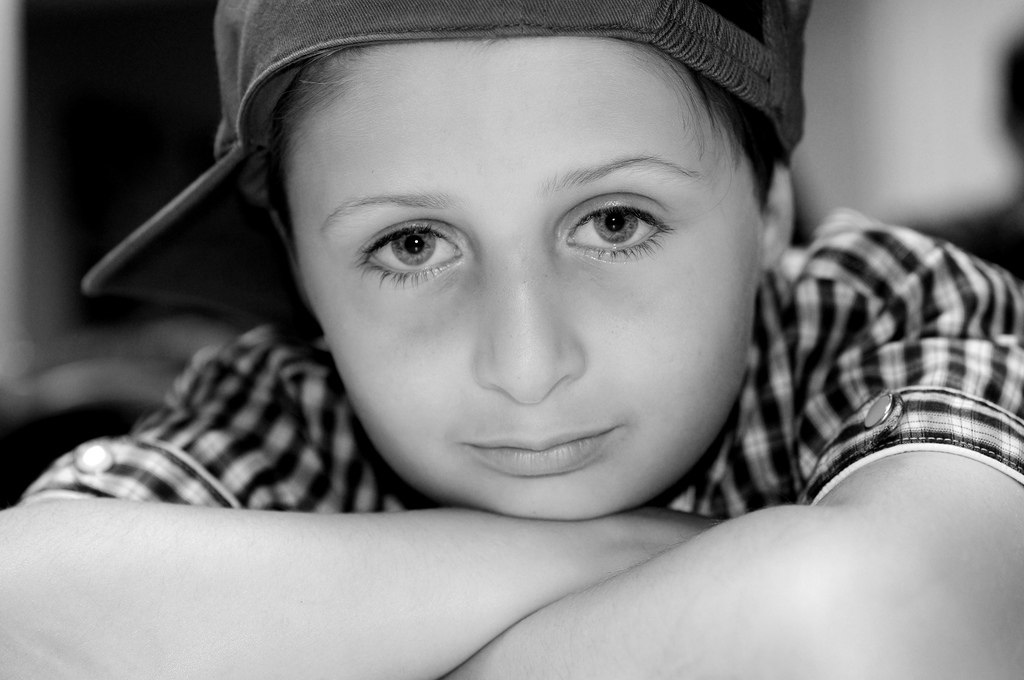Not sure if I want a 35mm or 50mm lens?
Not sure if I want a 35mm or 50mm lens for my Nikon dSLR. I know I want a small zoom lens for the best DoF, portraits, nature, and somewhat up-close. I want it to be a small mm. Which do you think is better?
Neither of those are zoom lenses, they are primes (fixed focal length).
If you want to do portraits then I suggest no less than 50mm focal length, or you may begin to get distortion.
If you want to do macro as well, then buy a 1:1 macro lens and use it for portraits too - Nikon has the 60mm f2.8 and 105mm f2.8 macros and on a cheaper budget, Sigma do a 50mm f2.8 macro and a 105mm f2.8 macro.
Here's a portrait with the Sigma 50mm f2.8 macro;

and here's a macro shot with it;

I have never had much of a need for a 35mm lens, but I do use a 50mm on a frequent basis. There's no overall "best" lens… It is a personal preference. Basically, the "best" lens is the one that does what you want when you want it to.
The best thing to do is:
1) If you have the 18-55mm kit lens (or any telephoto lens that can do 35 & 50mm), then set it to 35mm and shoot with it for a day or two, then set it to 50mm and shoot for another couple of days to see which gives you the framing you like.
OR
2) If you don't have a telephoto lens, visit you local camera shop and rent both for a week to see which one is better suited to your needs.
Now…
"best DOF"… That is determined more by the aperture that it is the focal length. If you are wanting "bokeh" or a shallow DOF, then you want a lens that is f/2 or faster (the lower the f/stop the "faster" it is).
For close-ups, a macro lens is the best way to go. A lot of macro lenses also serve as a regular lens. I prefer a 100mm macro lens, and a friend likes a 60mm macro… It depends on what you are shooting.
For portraits, I use a 50 f/1.4, an 85 f/1.8, and a 70-200 f/2.8 (in the 90-110 range). The wider the lens, the more distortion/disproportioning you can get on portraits.
First, the 35mm and 50mm lenses are prime (fixed focal length) lenses. They have no zoom.
Second, you need to know that on a 35mm film camera or full-frame DSLR a 50mm lens is considered a "normal" lens since its angle of view approximates that of the human eye. However, on a DSLR like your Nikon with its 1.5x "crop factor" a 50mm lens will have the angle of view of a 75mm lens on a 35mm film camera or full-frame DSLR. A focal length of between 85mm to 105mm is considered an ideal portrait focal length on a 35mm film camera or full-frame DSLR so on your cropped-sensor Nikon a 50mm lens makes a good portrait lens.
Third, on a 35mm film camera or full-frame DSLR a 35mm lens is considered a modest wide-angle lens. On a 1.5x "crop factor" DSLR the 35mm lens will have the angle of view of a 52.5mm lens on a 35mm film camera or full-frame DSLR. So on your cropped sensor Nikon DSLR the 35mm lens would be considered a "normal' lens.
Use the 50mm lens for portraits.
Use the 35mm lens when you want to photograph a scene close to how you saw it with your own eyes.
For a narrow DOF you need large aperture (small f number) the 50mm is the easiest lens to make and reasonably priced wide aperture versions are available.
A 35mm lens distorts features when used close up, anything coming towards the lens get exaggerated, this effect gets more exaggerated the wider (smaller focal length) you go), 50mm is as wide as you would want to go for portraiture and still has some slight distortion when used close up to the subject even on an APS sized sensor, slightly longer is even better for portraiture, anything in the 70 - 135mm range is ideal, a macro version extends it's versatility to be able to focus very close.
The most useful lens is actually the kit lens, if you can find one with a similar zoom range and a wider aperture (Sigma make a 17 - 50mm f2.8 constant aperture) it will the one you use most of all, wide enough for Landscape and just long enough for portraits.
- Creating a diy polymer lens filter for the solar eclipse and I want to make sure I'm not damaging my dslr light sensor
- Making a DIY Polymer Lens for my DSLR for the Solar Eclipse. Want to make sure i'm not ruining my new camera
- I want to start doing photography but I'm not sure which camera to get
- I want to buy a professional camera, not sure what type?
- I'm not sure if I fractured my collarbone or not?
